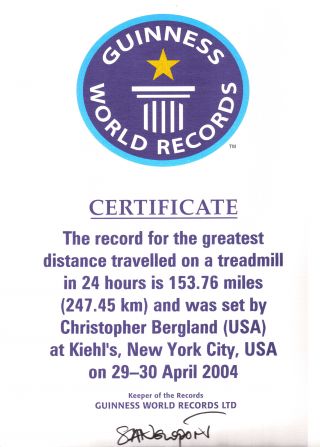Dopamine
I Want to Make You Want to Sweat
What motivates you to seek daily physical activity—or do you avoid exercise?
Posted April 10, 2014

Between April 29-30 of 2004, I broke a Guinness World Record by running 153.76 miles on a treadmill in 24 hours and it almost killed me. For the record: Running non-stop on a treadmill for 24 hours is not good for your well-being or leading a balanced life.
I retired from ultra-running after that "superhuman feat" when I found myself in the ICU at the Beth Israel Hospital for five days following the run. I was taken away from the treadmill run in an ambulance. My kidneys were on the verge of failure and my heart had literally begun to eat itself in order to complete the distance.
I realized in the hospital that my quest to push my body and mind to the edge of human potential was my achilles heel and would eventually lead to my demise. If you have any interest in the details of that treadmill run—and my perspective on the pros and cons of extreme athletics—check out my Psychology Today blog post "The Perils of Novelty Seeking."
I have spent the past decade deconstructing the athletic mindset and looking for ways to motivate people of all ages and levels of physical ability to seek a "tonic level" of exercise most days of the week. Finding original ways to motivate people to exercise is my raison d'être. I want to make you want to sweat.
All animals seek pleasure and avoid pain. If breaking a sweat is associated with positive emotions, and feeling good, it becomes something that you will want to do. The Athlete’s Way philosophy of “sweat = bliss” is rooted in the universality of our neurobiology.
The same endocannabinoids, dopamine, adrenaline, endorphins, and irisin that flows through my body and brain flows through yours, too. Along those same lines, through our daily lifestyle choices each of us has the opportunity to optimize our brain structure, connectivity, and cognitive function.
A recent blog post in the New York Times by Gretchen Reynolds titled “Are You Programmed to Enjoy Exercise?” reveals that some people might be genetically pre-wired to enjoy exercise more than others. Do you think you are someone who was genetically programmed to enjoy exercise, or do you detest breaking sweat at a deep biological level?

In her article, Reynolds cites a recent study from The Journal of Physiology titled “Nucleus Accumbens Neuronal Maturation Differences in Young Rats Bred for Low Versus High Voluntary Running Behaviour.” The study found that the innate desire to seek running behavior in young rats could be bred and was partly genetic.
Another study from August 2013 found that individual variations in the desire to be physically active versus sedentary is primarily a result of environmental influences but that genetic factors explain up to one-half of the variance. These findings suggest that innate biological processes may be driving some of our desire to seek daily physical activity.
My take away from this research is that although some people might be born with a natural proclivity to enjoy exercise, people can always rewire their brains through neuroplasticity and epigenetics. Mindset and behavior is never fixed.
Conclusion: What Motivates You to Want to Break a Sweat?

Are you someone who has always loved to exercise or does working out seem like a sufferfest to you? Have you been able to metamorphosize from being a person who hated to exercise to someone who loves it?
I’m always curious to learn what motivates someone to make physical activity a part of his or her daily routine. What motivates you to exercise? Please share your insights with myself and other readers in the comments here if you have time. Thanks!
If you’d like to read more of my Psychology Today blog please follow this link for a complete archive of The Athlete’s Way blog posts. Follow me on Twitter @ckbergland.


